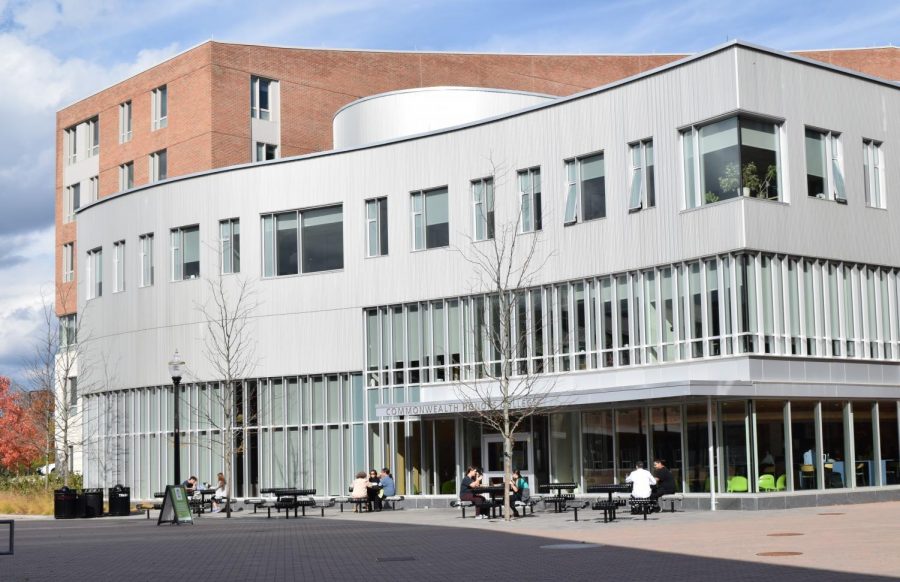Social psychology professor Lee Jussim, former chair of the department at Rutgers University, and Neil A. Lewis Jr., assistant professor of communication and social behavior at Cornell University, battled over their interpretations of widespread implicit bias in a forum at the Commonwealth Honors College events hall Thursday afternoon.
Each speaker first delivered a short presentation compiled together with research findings, statistics and studies of groups of people in order to better understand social disparities.
Professor Lewis began first, claiming that the prevalence of implicit bias has steadily increased over time. Lewis believes, through his research, that the average person is more likely to associate white people with “good things” and black people with “bad things.”
Lewis argued this point through a study conducted by the Yale Child Study Center about preschoolers and their teachers. The study directed preschool teachers to watch a diverse classroom of students, looking for challenging or troubling behaviors. Through eye tracking technology, results found that the teachers on average, had a tendency to observe black male students more than any other demographic. Teachers looked for incorrect behaviors from black boys 42 percent of the timein the study, white boys only 32 percent, white girls 13 percent and black girls only 10 percent.
Another study that Lewis presented showed the implicit bias of names. Principals were presented with the profiles of middle and high school students who violated the same rules and were supposed to receive disciplinary action. Without knowing the race of the students, the principals were more likely to give the child named “LaShawn” detention or suspension than a student named “Greg.”
This unconscious correlation between black and bad, Lewis explained, is why black students, particularly boys, are more likely to be sent to a principal’s office.
“People are seeing these biased behaviors as more of a pattern, and that the black students on average will always get in trouble more than the white students,” Lewis explained.
When asked if awareness programs and training will help fix the problem of implicit bias, Lewis expressed how he is less optimistic. Lewis believes that although interventions can still be used, results will most prominently show through “shifting a policy to make universal representation, that helps low income and minority students succeed.”
Jussim kicked off his segment of the forum by explaining that implicit bias is everywhere.
“When something is implicit, it means that there are concepts in the memory that are tightly linked to one another, whether we acknowledge this or not,” Jussim explained. “Often times, we associate vegetables with being green or healthy…This is also seen in everyday stereotypes, like Jews and banks, or women and cooking.”
Jussim argued how everything can be interpreted as implicit bias.
“Are teachers playing more attention to minority students? Implicit bias. Are teachers paying less attention to minority students? Implicit bias,” he said.
Jussim then moved into the use of the Implicit Association Test, a method used by researchers to track people’s associations of things. The test does not directly assess discrimination, but instead, measures the action times in which it takes people to chose or associate between two things. The outcome, in essence, is a speed time difference.
“There is no denying that there are gaps in race and income in America, but where do these gaps come from?” asked Jussim. According to his research, Jussim believes that these gaps are the result of a legacy of past discrimination, such as the Jim Crow laws, present discrimination — such as police stoppings of minorities — and institutional discrimination.
On institutional discrimination, Jussim claimed that minorities perform worse academically on average in high schools than white students due to schools being funded by property taxes, as white students are more likely to live in affluent areas.
“Richer areas have better schools,” Jussim said. “This exacerbates inequality.”
Unlike Lewis, Jussim believes that the IAT is one of the greatest sources for showing that there is not much individual discrimination, but rather group discrimination.
When discussing average IAT results, Jussim said, “It’s clear that gaps exist…But, based on the full scope of the evidence, rather than cherry pick certain cases to make a point, I think it’s hard to make a case that implicit prejudice explains very much about it.”
Jussim claimed that inequalities in the system create implicit bias, unlike Lewis, who said, “Implicit bias scores may reflect social realities more than they cause them, which is a result from structural environments.”
During the portion of the forum dedicated to audience questioning, Mostapha Massaee, a junior biology major and president of the University Union — which organized the forum — asked Lewis, “Why do you disagree with using the IAT, and why is it still used?”
Lewis explained how the IAT is usually the “go to” for measuring bias.
“I don’t use the IAT very much because there is a lot of uncertainty in it,” Lewis said. “I think there are a lot of other ways that we can measure these broader discrimination issues instead of just an association test.”
Both opponents concluded the panel with a progressive outlook, agreeing that the real conflict of implicit bias comes from institutions, and will only be fixed by assisting low-income and minority students better throughout high school.
Gretchen Keller can be reached at [email protected]and followed on Twitter @gretchenkellerr.





















Austin • Apr 8, 2018 at 7:04 pm
Great article and topic to discuss.